- Home
- Franz Kafka
The Metamorphosis and Other Stories Page 21
The Metamorphosis and Other Stories Read online
Page 21
Speaking to the nomads is impossible. They do not know our language; indeed, they barely have one of their own. They communicate among themselves rather like jackdaws. Again and again, that jackdaw cry can be heard. Their inability to fathom our way of life, our institutions, is just as great as their indifference to them. As a result, they also respond to any kind of sign language with rejection. You can even dislocate your jaw and twist your hands out of your wrists and they will not have understood you and never will understand you. They often contort their faces; the white of their eyes turns and foam emerges from their mouth, but they neither wish to say anything, nor to frighten anyone; they do it because it is in their nature to do so. What they need, they take. You can’t say that they use force. Before they seize something, you step aside and relinquish everything to them.
They have also taken several good things from my supplies. I can’t complain about it, however, when I see how things are for the butcher across from me, for example. As soon as he has fetched his wares, they are already snatched from him and devoured by the nomads. Their horses also eat meat; a rider often lies next to his horse and both feed on the same piece of meat, one at each end. The butcher is afraid and does not dare to discontinue the meat deliveries. But we understand this, pool our money together, and support him. If the nomads did not get their meat, who knows what they would think of doing; although, who knows what they would think of even if they do get their daily meat.
Only recently, the butcher thought he could at least spare himself the trouble of slaughtering and brought a live ox one morning. He mustn’t ever do that again. I must have lain flat on the floor, all the way at the back of my workshop for an hour, with all my clothes, blankets, and cushions piled on top of me, just to keep from hearing the bellowing of the ox, which the nomads had leapt on from all sides, ripping pieces out of its warm flesh with their teeth. It had been still for some time before I dared to go out; like drinkers around a wine barrel, they lay tiredly around the remains of the ox.
That was the time when I thought I saw the Emperor himself in the palace window; he never comes to these outer chambers otherwise; he always lives only in the innermost garden; but this time he was standing there at one of the windows—so it seemed to me, at least—watching the goings-on in front of his palace with a lowered head.
“How will it end?” we all ask ourselves. “How long will we bear this burden and torment? The Imperial Palace has attracted the nomads, but doesn’t know how to drive them away again. The gate remains locked; the guards, who used to always be marching in and out ceremoniously, remain behind barred windows. We craftsmen and traders have been entrusted with the salvation of our fatherland; but we are not equal to such a task; and we have never boasted that we were capable of it either; it is a misunderstanding and it will be our ruin.”
CLOTHING
Often, when I see clothing with multiple pleats, ruffles and decorations lying beautifully on beautiful bodies, I think that they do not remain this way for long, but will get wrinkles that can no longer be ironed smooth, gather dust so thick in the ornaments that it can no longer be removed, and that no one would want to make themselves so sad and ridiculous as to put the same precious gown on every morning and take it off in the evening.
And yet I see girls, who are certainly beautiful and have multiple charming muscles and little bones and taut skin and masses of fine hair, who nonetheless appear daily in the same natural costume, always resting the same face on the same hands and looking in their mirror.
Only sometimes in the evening, when they come home late from a party, that face in the mirror appears to be worn out, puffy, dusty, already seen by everyone, and hardly wearable any longer.
A VISIT TO THE MINE
Today the top engineers came down below to visit us. Some sort of order was issued by the management to make new galleries and the engineers came to conduct the first measurements. How young these people are and already so different! They have all developed freely, and their precise character already shows itself without restraint in their early years.
One of them, black-haired, lively, lets his eyes roam in all directions.
A second, with a notebook, records things as he walks, looks around, compares, takes notes.
A third, with his hands in his coat pockets, making everything about him tense, walks upright; he preserves his dignity; only his perpetual lip-biting reveals his impatient, irrepressible youth.
A fourth is giving the third explanations that he has not asked for; smaller than the third, and running along beside him like a tempter, he seems to be reciting a litany to him, his index finger constantly in the air, about everything to be seen here.
A fifth, perhaps the highest in rank, tolerates no accompaniment; he is at the front one moment, at the back the next; the group conforms to his pace; he is pale and weak; responsibility has hollowed out his eyes; often, in contemplation, he presses his hand against his forehead.
The sixth and seventh walk slightly bowed, head close to head, arm in arm, in intimate conversation; if this was not obviously our coalmine and our workplace in the deepest gallery, one could believe that these bony, beardless, button-nosed gentlemen were young clerics. One is laughing to himself, usually with a catlike purr; the other, also laughing, is doing the talking and adding some sort of rhythm with his free hand. How sure these two gentlemen must be, indeed, what service must they already have rendered our mine despite their youth, that they are allowed to occupy themselves so resolutely, during such an important inspection and before the eyes of their superior, only with their own concerns, or at least with concerns that are unrelated to the current task. Or might it be possible that they, despite all their laughter and inattentiveness, are perceiving that which is necessary after all? One hardly wishes to risk a certain judgment about such gentlemen.
On the other hand, there is no doubt that the eighth, for example, is incomparably more attentive that they are, indeed than all the other gentlemen. He has to touch everything and tap it with a little hammer that he is constantly taking out of his bag and constantly stashing there again. Sometimes he even kneels down in the dirt despite his elegant clothing and taps on the floor, and then again, as he is walking along, taps the walls or the roof above his head. Once he lay down at full length and lay there still; we almost thought an accident had occurred; but then he jumped up with a little twitch of his lean body. So he’d only been carrying out another inspection. We think we know our mine and its stones, but what this engineer is constantly inspecting in this way is beyond our comprehension.
A ninth pushes a kind of baby buggy in front of him in, in which measuring instruments lie. Extremely valuable instruments, laid deeply in the softest cotton. This cart should actually be pushed by an attendant, but it is not entrusted to him; an engineer had to be called, and he is glad to do it, as one can see. He is probably the youngest; perhaps he doesn’t even understand all the instruments, but he keeps his eyes on them constantly, almost putting him in danger of bumping the cart into the wall.
But there is another engineer who walks along next to the cart and prevents it. He obviously understands the instruments thoroughly and seems to be their true guardian. From time to time he takes some part of the equipment out of the cart without stopping it, looks it over, screws it open or closed, shakes and taps, holds it to his ear and listens. And finally, while the cart driver is usually standing still, he lays the little thing, hardly visible from a distance, with the utmost caution back into the cart. This engineer is rather domineering, but only on the instruments’ behalf. Ten steps before the cart, at a wordless finger signal, we are already supposed to step aside, even where there is no room to do so.
The idle attendant walks behind these two gentlemen. As is to be expected given their great knowledge, these gentlemen have long since discarded any arrogance; the attendant, on the other hand, seems to have collected it all within himself. With one hand on his back, the other in front above the gilt buttons or t
he fine cloth of his liveried coat, he nods frequently to the right and left, as though we had greeted him and he were responding, or as though he had assumed that we had greeted him but was unable to verify it from his great height. Of course we do not greet him, although the sight of him almost makes you believe that it is a huge thing to be office attendant to the management of the mines. Admittedly, we laugh behind his back, but because not even a crack of thunder could prompt him to turn around, he still remains as something incomprehensible in our estimation.
Today, not much more work will get done; the interruption was too extensive; such a visit takes all thought of work away with it. It’s far too tempting to look after the gentlemen in the darkness of the trial gallery into which they have all disappeared. Our shift will also be ending soon; we’ll not be watching the gentlemen when they return.
THE NEXT VILLAGE
My grandfather used to say: “Life is astonishingly short. Now, in my memory, it is so compressed that I can hardly fathom, for example, how a young man can decide to ride to the next village, without being afraid that—quite apart from unfortunate accidents—even the timespan of an ordinary, fortunately passing life is far from sufficient for such a ride.”
THE CARES OF A HOUSEHOLD FATHER
Some say the word Odradek is of Slavonic origin and attempt to account for the word’s formation on this basis. Others believe that its origin is German, and that it is only influenced by the Slavonic. The uncertainty of both interpretations, however, probably allows us to rightly conclude that neither applies, especially because neither one can offer any help in finding the word’s meaning.
No one, of course, would concern themselves with such studies if a creature named Odradek did not really exist. Initially, it looks like a flat, star-like bobbin, and it does in fact appear to be covered with twine; although it seems they are only torn, old, knotted, or matted together pieces of twine of the most various types and colors. But it is not only a spool; a small rod sticks out from the middle of the star and another one then fits into this rod at a right angle. With the help of this last little rod on the one side, and one of the rays of the star on the other side, the entire thing can stand upright as if on two legs.
One would be tempted to believe that this construction used to have some sort of functional shape and is now only broken. But this does not seem to be the case; at least no indication for this can be found; no signs or fractures are to be seen that would indicate as much; although the entire thing appears to be useless, it is complete in its own way. More cannot be said about it, incidentally, because Odradek is extraordinarily agile and impossible to catch.
He is alternatively located in the attic, the stairwell, the corridors, the hall. Sometimes he is not to be seen for months; then he has probably moved to other houses; but inevitably he returns to our house again. Sometimes, if you step out of the door and he happens to be leaning against the banister, you feel like approaching him. Of course, you don’t ask him any difficult questions, but treat him—alone, his tininess tempts you to do so—like a child. “So what’s your name?” you ask him. “Odradek,” he says. “And where do you live?” “No fixed address,” he says and laughs; but is only the kind of laugh that can be generated without lungs. It sounds rather like the rustling of fallen leaves. With that the conversation is usually over. These answers, by the way, are not always given; often he is silent for a long time, like the wood that he appears to be.
I ask myself in vain what will become of him. Can he even die? Everything that dies used to have some kind of purpose, some kind of function, and it has worn itself out doing it; this does not apply to Odradek. So will he one day tumble down the stairs, perhaps before the feet of my children and my children’s children, with his threads of twine trailing behind him? Apparently he doesn’t harm anyone; but the thought that he should also outlive me is almost a painful one.
THE TREES
For we are like tree trunks in the snow. They seem to be resting on the smooth surface, and you should be able to push them away with a little nudge. But, no, you can’t, for they are firmly attached to the ground. So you see, even this is only illusory.
ELEVEN SONS
I have eleven sons.
The first is quite unsightly on the outside, but earnest and clever; nevertheless, although I love him as I do all my other children, I do not think very highly of him. His way of thinking seems to me too simple. He looks neither to the right, nor to the left, nor far into the distance; he constantly runs, or rather rotates, around in his little circle of thought.
The second is handsome, slender, well built; it is delightful to see him in a fencing pose. He too is clever, but he has experience of the world as well; he has seen a lot, and so it seems that even the natural landscape itself speaks more intimately to him than those who have stayed home. Although this asset is certainly not due solely, or even essentially, to his travels; rather it belongs to his inimitable nature, which is, for example, acknowledged by everyone who tries to imitate him as he dives acrobatically, and with multiple somersaults and an almost wild restraint, into the water. The courage and enthusiasm last until the end of the diving board, but instead of jumping, the imitator suddenly sits down and raises his arms in apology.—And despite all this (I should actually be happy to have such a child, after all), my relationship to him is not unclouded. His left eye is slightly smaller than the right one and blinks a lot; a little flaw, certainly, that makes his face even more dashing than it would have been otherwise, and considering how unapproachably self-contained he is by nature, no one would take disapproving notice of this smaller blinking eye. I, his father, do so. Of course, it is not this physical flaw that pains me, but a slight irregularity in his soul that somehow corresponds to it; some poison infecting his blood, some inability to perfect his natural disposition that is only visible to me. On the other hand, this especially makes him my own true son, for this flaw of his is also the flaw of our entire family and only particularly evident in this son.
The third son is equally handsome, but it is not the kind of handsomeness that pleases me. It is the handsomeness of a singer: the curved lips; the dreamy eyes; the head that requires a drapery behind it to have an effect; the excessively arching breast; the hands that are quick to rise up and far too quick to be lowered; the legs that act coyly because they can carry no weight. And furthermore: the sound of his voice is not full; it deceives for a moment, allows the expert to prick up his ears, but runs out of breath soon thereafter.—Although everything in general tempts me to show this son off, I prefer to keep him hidden; he does not impose himself, not because he is aware of his shortcomings, but out of innocence. Also, he feels strange in these times, as though he belongs to my family, but also to another one lost to him forever; he is often listless, and nothing can cheer him up.
My fourth son is perhaps the most sociable of all. Truly a child of his time, he can be understood by everyone, he stands on common ground with all, and everyone is inclined to give him a nod. Perhaps from this general recognition, his nature gains a kind of lightness, his movements a kind of freedom, his judgments a kind of carelessness. You may wish often to repeat some of his sayings, but only some, for in general, he suffers from too much lightness. He is like someone who jumps admirably, cutting the air like a swallow, only to land dismally in the bleak dust, a nothing. Such thoughts sour the sight of this child for me.
The fifth son is kind and good. He promised far less than he fulfilled and was so insignificant that one literally felt alone in his presence, but he still managed to achieve some standing. If someone were to ask me what happened, I could hardly answer. Perhaps innocence is still able to cut through the raging elements of this world most easily after all. And innocent he is—perhaps all too innocent. Kind to everyone—perhaps all too kind. I confess: I become uncomfortable when someone praises him to me. After all, they say that praising is made somewhat too easy when one praises someone so obviously praiseworthy as my son.
M
y sixth son seems, at least at first glance, to be the most pensive of all. He hangs his head, but is still a chatterer. This is why it is not easy to reach him. If he loses, he falls into unconquerable sadness; if he gains the upper hand, he maintains it by chattering. But I don’t deny that he has a certain self-forgotten passion; in broad daylight he often struggles his way through his thoughts as though in a dream. Without being ill—in fact his health is very good—he staggers at times, particularly during nightfall, but needs no help, does not fall. Perhaps his physical development is responsible for this phenomenon; he is far too tall for his age. This makes him generally unattractive, despite strikingly attractive details such as his hands and feet. His forehead is also unattractive, by the way; somehow shrunken in the skin as well as the bone structure.
The seventh son belongs to me perhaps more than all the others. The world does not know how to appreciate him; it doesn’t understand his particular sort of humor. I do not overestimate him; I know, he is limited enough; if the world had no other flaw other than its inability to appreciate him, it would still be perfect. But within the family, I would never want to do without this son. He brings unrest as well as a deep respect for tradition, and joins both, at least as I see it, into an incontestable whole, although he himself knows less than anyone about what to do with this whole. He will not be the one to set the wheel of the future in motion, but his nature is so cheery, so hopeful, I would wish for him to have children, and for them to have children in turn. Unfortunately, it doesn’t seem that this wish is going to be fulfilled. With a complacence that is as comprehensible to me as it is undesirable, and which also happens to stand in stark contrast to the judgment of those around him, he roams around alone, is not concerned with girls, and will still never lose his good humor.

 Diaries of Franz Kafka
Diaries of Franz Kafka Metamorphosis and Other Stories
Metamorphosis and Other Stories The Castle: A New Translation Based on the Restored Text
The Castle: A New Translation Based on the Restored Text The Complete Stories
The Complete Stories In the Penal Colony
In the Penal Colony The Trial
The Trial Amerika
Amerika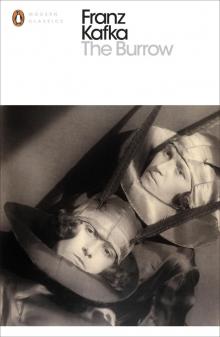 The Burrow: Posthumously Published Short Fiction
The Burrow: Posthumously Published Short Fiction Sons
Sons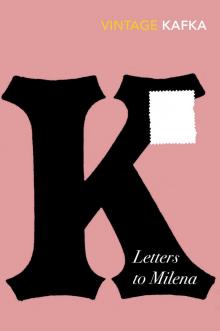 Letters to Milena
Letters to Milena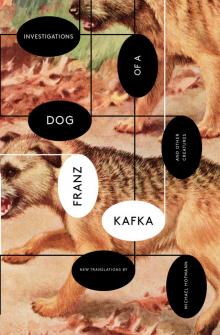 Investigations of a Dog: And Other Creatures
Investigations of a Dog: And Other Creatures Collected Stories
Collected Stories The Great Wall of China
The Great Wall of China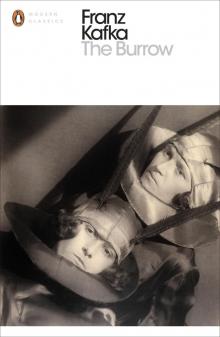 The Burrow
The Burrow The Castle
The Castle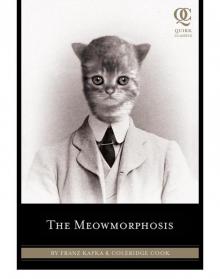 The Meowmorphosis
The Meowmorphosis The Sons
The Sons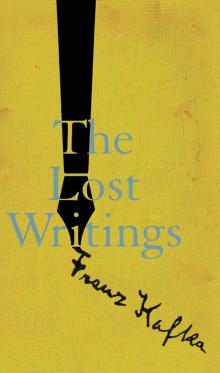 The Lost Writings
The Lost Writings The Unhappiness of Being a Single Man
The Unhappiness of Being a Single Man Amerika: The Missing Person: A New Translation, Based on the Restored Text
Amerika: The Missing Person: A New Translation, Based on the Restored Text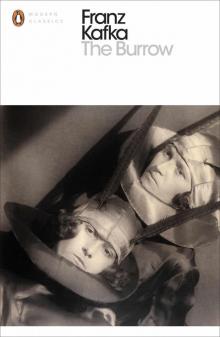 The Burrow: Posthumously Published Short Fiction (Penguin Modern Classics)
The Burrow: Posthumously Published Short Fiction (Penguin Modern Classics) The Diaries of Franz Kafka
The Diaries of Franz Kafka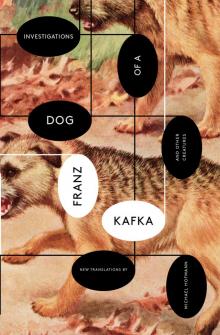 Investigations of a Dog
Investigations of a Dog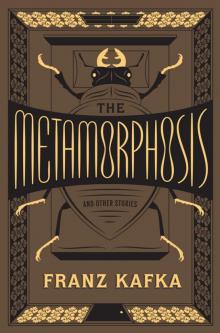 The Metamorphosis and Other Stories
The Metamorphosis and Other Stories The Trial: A New Translation Based on the Restored Text
The Trial: A New Translation Based on the Restored Text